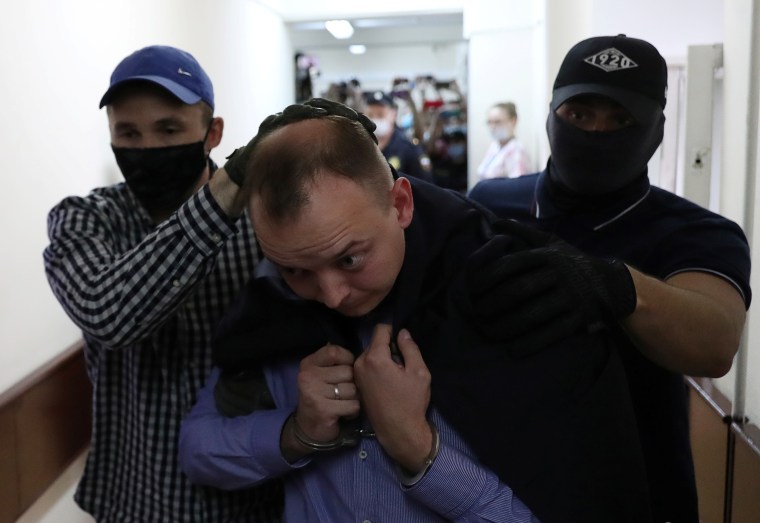New York, July 8, 2020 – Russian authorities should release journalist Ivan Safronov immediately, drop the charges against him, and allow the press to cover his case freely, the Committee to Protect Journalists said today.
Yesterday, Russian Federal Security Service officers detained Safronov near his Moscow apartment and charged him with high treason for allegedly spying for the Czech Republic, according to media reports.
Safronov worked as a military correspondent for Russian business dailies Kommersant and Vedomosti and reported on Russia’s military and its aerospace industry for over 10 years, according to news reports. In May, he left journalism to take a job as an advisor at the Russian government space agency Roskosmos, according to reports.
Ivan Pavlov, the journalist’s lawyer, alleged in an interview with independent broadcaster Dozhd that the charges were linked to Safronov’s past reporting. If convicted, he could face up to 20 years in jail, according to Kommersant.
Yesterday and today, at least two dozen journalists were detained protesting his arrest, according to news reports, although most were later released.
“Russian authorities have showed once again that they will stop at nothing to threaten and imprison independent journalists,” said Gulnoza Said, CPJ’s Europe and Central Asia program coordinator. “Ivan Safronov should be immediately released, and the bogus spying charges against him should be thrown out. Other journalists who show their support for Safronov by protesting should be allowed to do so without fear of reprisal.”
Pavlov told Dozhd that his client was accused of spying for the Czech Republic since 2012 and of passing secrets “about military cooperation between Russia and a Middle Eastern-North African country” to Czech special services in 2017, “which, in turn, collaborated with the United States.”
Pavlov said the warrant launching the investigation did not specifically cite any of Safronov’s journalism or contain any evidence against him, but said that investigators mentioned the journalist’s March 2019 reporting on Russia’s sale of jet fighters to Egypt.
Russian authorities ordered Kommersant to delete that reporting in June 2019, claiming that it contained state secrets, according to reports. Following that report’s publication, the U.S. government threatened Egypt with sanctions for buying Russian warplanes, according to news reports from the time.
Kommersant fired Safronov in May 2019 under government pressure following that report’s release, according to the BBC.
Safronov also covered other sensitive topics, such as the deaths of three Russian soldiers in Syria and allegations of an American spy in the Kremlin.
Speaking to journalists at a press conference yesterday in Moscow, presidential spokesperson Dmitry Peskov called Safronov a “talented journalist” but denied that the charges were related to his journalism, according to independent news website Meduza.
Safronov’s father, who had the same name, also covered defense, the military, and space for Kommersant, and died after falling out of a window in March 2007, which authorities deemed a suicide, according to CPJ research. In an October 2007 special report, CPJ investigated other theories about the journalist’s death.
Yesterday, Moscow law enforcement also detained Taisiya Bekbulatova, chief editor of independent news site Kholod, at her apartment, according to media reports. Bekbulatova, who is close friends with Safronov, was released today without charge, but police confiscated journalistic equipment and bank cards during her arrest, according to reports and a Facebook post by the journalist.
She wrote that the authorities also confiscated equipment from her colleague, Kholod podcast editor Aleksey Ponomaryov, who was in her apartment at the time, as both were working on a podcast together. Bekbulatova called charges against Safronov “absurd.”
The editorial team of Kommersant published a statement in support of Safronov, calling him “one of Russia’s best journalists” and a “true patriot” who would not spy for a foreign country.
Following Safronov’s arrest, dozens of journalists staged protests in front of the Federal Security Service buildings in Moscow and in other cities, and several were briefly detained, according to multiple reports by Meduza, which also published video of detentions at the protests.
In Moscow yesterday, police detained Reuters correspondent Polina Nikolskaya, Vedomosti correspondent Alina Didkovskaya, Meduza correspondent Liliya Yapparova, Kommersant journalists Elena Chernenko, Kira Dyuryagina, Marianna Belenkaya, and Aleksandr Chernykh, independent blogger Kseniya Sobchak, The Bell investigative outlet correspondent Anastasiya Stogney, Proekt news website correspondent Olga Churakova, Kholod correspondent Yulia Dudkina, Batenka independent news website correspondent Galina Sakharevich, and MBK Media independentnews website correspondent Anastasya Olshanskaya, according to Meduza and Kommersant.
All the journalists except Chernenko and Dyuryagina, both of Kommersant, were released without charge, according to those reports.
Chernenko was charged with violating quarantine regulations and then released, according to news reports. If convicted, she can be fined up to 30,000 rubles (US$420). Dyuryagina was released after being charged with illegally holding a protest, and could be fined up to 50,000 rubles (US$700) if convicted, according to those reports.
Individual journalists also staged protests in St. Petersburg and the cities of Yekaterinburg and Novosibirsk, and none were reportedly detained, according to reports.
Today, Moscow police detained Mariya Sherstyukova, a correspondent for state news agency RT, and Nikita Mogutin, a correspondent for the Baza independent news website, while protesting for Safronov’s release, according to reports.
In Perm, a city close to the Ural mountains, police arrested Mikhail Danilovich, an independent journalist who was protesting Safronov’s case, according to reports.
Immediately after Safronov’s arrest, the head of Roskosmos, Dmitry Rogozin, said that Safronov had not had access to classified information at the space agency and would retain his job.
When CPJ called the central office of Federal Security Service in Moscow, an officer on duty refused to give his name or comment on the case.
